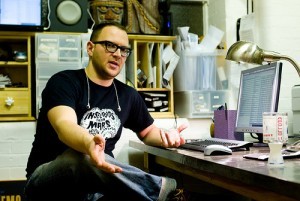
By Holly Phillips, Contributor
I met up with Cory Doctorow a few weeks ago at the Vancouver International Writers Festival, three-quarters of the way through his continent-wide tour promoting his new novel, Pirate Cinema. In her introduction to Doctorow’s festival event, festival board member Sally Harding called Pirate Cinema, “a subversive novel,” but it was a Publishers Weekly review that labelled it as a “rabble rouser.” When I asked Doctorow, he admitted he was ready to embrace the term.
“Sure,” he said. “Rousing rabble has been something I’ve been doing for a long time.”
Cory Doctorow is an internationally recognized expert on copyright in the digital age— I know that when I tell people that, their eyes often glaze over with anticipated boredom. Copyright? How dull is that? But Doctorow draws a straight line from copyright infringement issues to personal rights and freedoms. In fact, it was his outrage at the passing of the “three strikes” law in the UK, where he lives, that in large part inspired the writing of Pirate Cinema.
In the book, 16-year-old Trent McCauley is busted under “three strikes.” Digital surveillance on his computer has revealed that he stole copyrighted video so that he could make his own films using footage on the web. Do it three times and you’re out; you and your household lose all Internet access for a year. This is calamitous for Trent’s family, as both his parents must work from home, and his sister does her schooling over the Internet. So by the end of the first chapter, a guilt-ridden Trent is out of the house, on the road, and on the way to meeting some of Doctorow’s liveliest counter-culture rebels yet.
Reading Pirate Cinema is a bit like jumping on a train already in motion: you grab on tight and get hauled off on a non-stop ride. Talking with Doctorow was pretty much the same. He’s got a huge reservoir of experience and expertise, and when I asked a question, I found I had to brace myself for the facts, ideas, and opinions that came blasting out at firehose pressure. William Gibson called Doctorow “a native of the 21st century,” and the sense I got was of a man who spends at least half his life swimming in the Internet sea. He is, after all, a co-editor of Boing Boing, one of the highest-rated techno-blogs on the net. Get him talking about copyright and publishing, and he’ll give you a manifesto for a drastic rethink of copyright and the role it plays in protecting artists’ rights and livelihoods. (He’ll also tell you with great enthusiasm about the Humble eBook Bundle, which is definitely worth a look. It’s a whole new approach to getting books into people’s hands).
However, if you get Doctorow talking about writing, a whole new side of him comes to light—a very human side. Talking about his approach to science fiction, he said, “I think writing optimistic speculation is not merely about writing futures in which good things happen. I think you can actually write very optimistic speculation in which bad things happen in the future and people react to them with resilience and grace.” That is what he’s doing in Pirate Cinema. His characters are rebels, even outcasts, but they strive not just to beat the system, but to change it for the better, and for the betterment of everyone’s lives. It isn’t preachy, though. For all his passionately held opinions, Doctorow, as a writer, keeps the focus tightly on his characters.
And he does love writing about young protagonists. In his words, he loves “These kind of virginity-loss moments, where you do something when you can’t tell who you’re going to be when it’s over.” The world of youth is big and new, and everything his characters do matters intensely to them, and the sometimes to the world. It makes for exciting reading. And Cory has great fondness and respect for his audience, too. He likes to say of his books, it’s as though the novel “puts its arm around [the reader’s] shoulder and says, ‘Look, kid, I’m going to explain to you how the world works…’ and it is an honour and a privilege, and a responsibility, to be in that sweet spot with kids.”
This level of respect shows in his writing. Though Doctorow’s passion for the issues shines through, you never get the sense that he’s trying to convert you to his cause. He doesn’t necessarily want his readers to agree with him, but just to pay attention. “I want them to be in the battle, to acknowledge the importance of the battle, to make up their minds about it for themselves.”
So maybe what he’s doing isn’t so much rousing the rabble, as empowering the rabble to rouse themselves.
